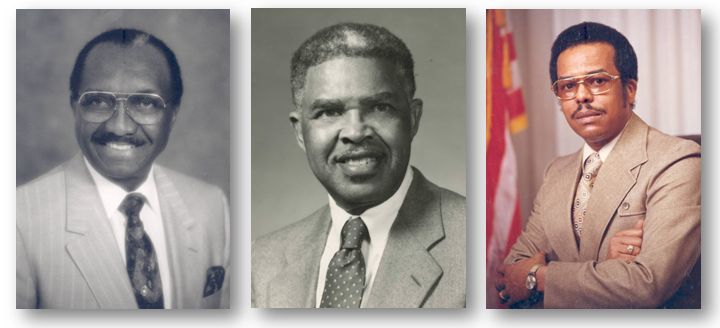
Rev. James Netters, Fred Davis, and J.O. Patterson, Jr.
On January 1st, 1968, thirteen members of the new Memphis city council took office. Among them were three black council members: Rev. James Netters, Fred Davis, and J.O. Patterson Jr. Despite blacks comprising a little less than 40 percent of the city’s population in 1968, these three men were the first black Memphians to hold elected office in city government since 1882.
The key to this change was the crucial move away from the old city commission system to the new council system. Under the old system, the entire city elected a board of five commissioners. That citywide election system allowed the white majority to effectively shut the black minority out of power. However, the system also proved susceptible to manipulation as demonstrated by boss E. H. Crump’s decades long grip on city government. By the late 1960s, many reform minded Memphians, both white and black, had gathered enough support to convince voters to adopt a system they felt was less prone to political patronage. The result was the new council system.
Though better than the old system, the new council still did not provide black Memphians with representation proportional to their actual voting power. Specific areas of the city, known as districts, elected seven out of thirteen council seats. A few of these districts were majority black, but most were majority white. The entire city elected the remaining six at large seats similar to the previous system. The issue was that during talks about the adoption of a new government, white conservatives had held the line and insisted on the inclusion of these at large seats. Though frustrating for several of Memphis’ black leaders, it was the best deal many felt they could get given the circumstances.
Either way, the new government was shaky and still trying to find its feet during the first few months of 1968. For example, when an opportunity to intervene in the strike arose in late February, the city council abdicated responsibility and passed a resolution giving the mayor sole authority to conduct strike negotiations. Later, when the three black council members tried to introduce resolutions that met the union’s demands, they lost the vote. Though, white council members such as Jerred Blanchard occasionally joined them in voting for these measures. In many ways, the situation of a new government along with unequal representation of blacks on the council determined the city’s response to the strike.
Unknown. “Historic Scene—New City Council Sworn In.” Press Scimitar (Memphis, TN), Jan. 1, 1968.
Riker, Jefferson. “Conservatives, 3 Negroes Chosen for New Council; State Senators Lose Bids.” Commercial Appeal (Memphis, TN), Nov. 3, 1967.
Dowdy, G. Wayne. A Brief History of Memphis. Charleston: The History Press, 2011.
Dowdy, G. Wayne. Crusades for Freedom: Memphis and the Political Transformation of the American South. Jackson: University of Mississippi Press, 2010.
Beifuss, Joan Turner. At The River I Stand. Memphis: St. Luke’s Press, 1985.






